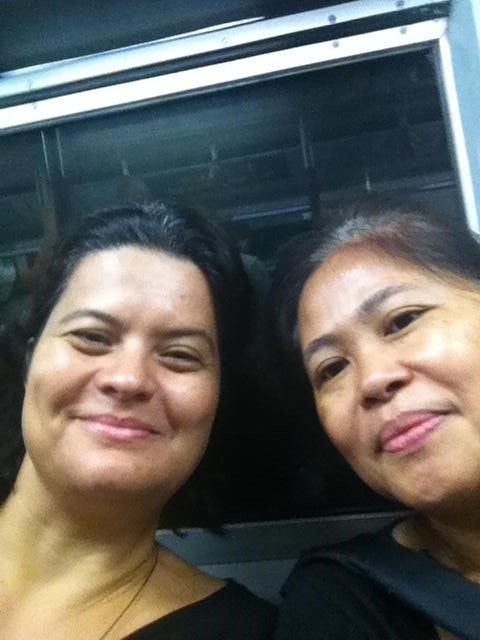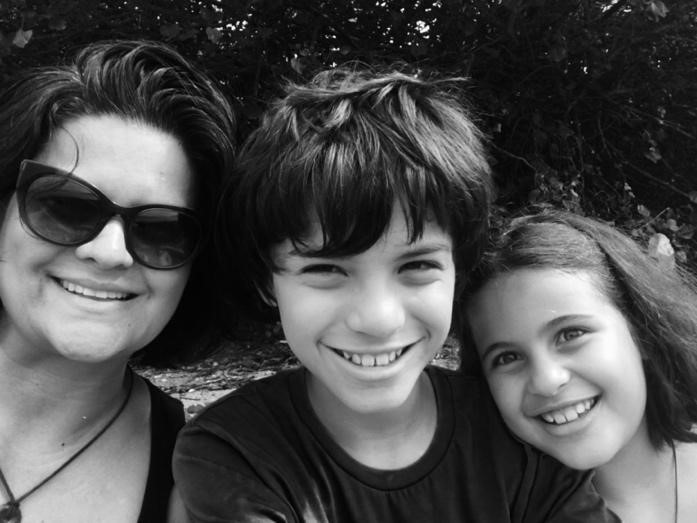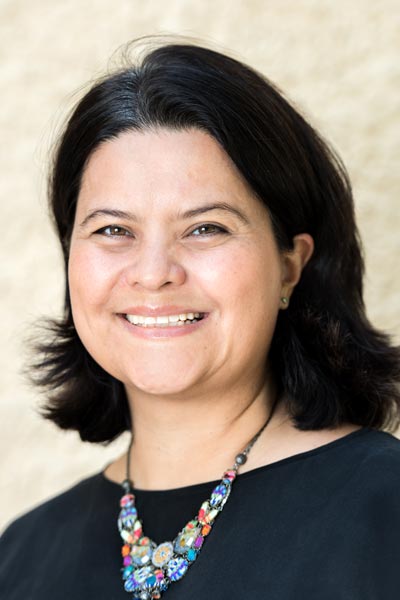HELP for Domestic Workers are lucky to have some incredibly skilled and empathetic individuals working as full time staff. When a domestic worker seeks our assistance, chances are they receive support and guidance from our case manager, Raquel Amador.
Raquel joined HELP in September 2015 thanks to a multi-year grant from Mission Impossible. A United Kingdom qualified lawyer with a background in immigration, asylum and human rights law, she previously co-founded Hong Kong Refugee Advice Centre, now known as Justice Centre.
We sat down with Raquel to understand her passion for helping others and more.
Thanks for sharing your experience with us, Raquel!
HELP: Where are you from and how long have you been in Hong Kong?
Raquel: My mother is Dutch and my father from the Philippines. I was born in Holland and grew up in Curacau, New York and Hong Kong. While I consider Hong Kong as my home, I have lived and worked in the United Kingdom for several years and I continue to travel back and forth to the Philippines, as I have for much of my life.
HELP: Tell us about your first encounter with a domestic worker.
Raquel: I met Tessie, my parents’ domestic worker when I was about 10. She used to play badminton with me in the garage downstairs, take me to movies, bring me sweets when she returned from her rest days and fix my younger sister’s hair into beautiful braids. I remember her as calm and reassuring presence in the house. Tessie moved to Canada to work after a few years because she was a qualified nurse in the Philippines.
My parents’ next domestic worker was Femia and she has worked for my family for over 20 years. She is only in her 50s now, which makes me realise how young she was when she first started working for my parents. Femia is very organized and practical and amazing with her hands, she can fix anything!
She helped bring up my children and is a gentle and positive influence in their lives. She helped my mother manage the household when my father became ill and later when he passed away. I am not sure what we would have done without her during this time. Femia nurtured me and my family. I will always be grateful to her for her kindness, patience, grace and courage. She had many things to manage in her personal life and I recognise the impossible choices she had to make as a single mother to work for my family, leaving behind her daughter and later her grandchildren, to provide for them and give them the opportunities she never had.

HELP: How did you get involved with HELP?
Raquel: Prior to working with HELP, I provided legal advice to asylum seekers and refugees in the United Kingdom and Hong Kong. I took a break from work to be with my children and when I was looking to come back, I was interested in helping domestic workers, who are also on the migration continuum. I wanted to gain a better understanding of the challenges they face and I felt that my legal skills would be useful to HELP.
HELP: Why do you feel supporting domestic workers, and HELP, is so important?
Raquel: I think that we can gauge the level of civilisation of a society by how we treat the most vulnerable people in it. Domestic workers are vulnerable to exploitation due to the inequalities in society. We must see domestic workers as human beings with rights and obligations like any other member of society. Domestic workers contribute to the economic welfare of society because their presence enables both parents to work and they enhance the cultural fabric of society. It is important to ensure that the laws protecting domestic workers are upheld and that the the laws and policies themselves are challenged if necessary.
HELP: From your work with HELP, what do you think are the most common issues domestic workers in Hong Kong are facing?
Raquel: One of the most significant problems is the two-week rule, where domestic workers are required to exit Hong Kong only 14 days after their contract ends. It means that many domestic workers remain in situations of ill-treatment or abuse because they are afraid they will not be able to find other employment within the requisite time.
If they do leave their employment to pursue their rights in the labour department and the courts, they find themselves in a difficult situation because the government will not permit them to work, and so they are reliant on charity to support themselves. They also need to pay visa fees of HK$190 each time to extend their stay in Hong Kong. Once they reach the end of their labour cases, they must return to their home country to process new employment contracts, and while there they can then fall prey to unscrupulous employment agencies that charge unlawful and exorbitant placement fees.
Another difficulty is that domestic workers are required to live with their employers in their homes. This blurs the line between their work and private lives and domestic workers can often be “on call” until all hours with very long working hours. Such arrangements hide them from public view so that it becomes easier for employers to abuse them without other people finding out, as is what happened in the high-profile case of Erwiana.
Domestic workers also commonly face sub-standard accommodation, which subjects them to exploitation in the sense that they get very little rest. It can also sometimes render them subject to sexual assault and harassment.
HELP: What’s one thing you’ve learnt about yourself/Hong Kong through your work with HELP?
Raquel: I’ve learned that, in not making ourselves aware of the rights of domestic workers, we are complicit in a system, which can subject domestic workers to exploitation.
Prior to working at HELP, I was not aware of the laws applicable to domestic workers. I did not know what their rights were regarding employment agencies – that they should not be charged more than 10% of their first month’s wages by way of placement fee. Many unscrupulous agencies charge far more than this. I also did not know what their rights were if they fell ill or became pregnant.
HELP: What do you wish the public knew about domestic workers in Hong Kong?
Raquel: Domestic Workers have the benefit of the same law, i.e. the Employment Ordinance that governs all Hong Kong workers. However, domestic workers are also subject to policies like the two-week rule and the live-in rule, which means that they have unequal protection.
HELP: What advice do you have for domestic workers who are being mistreated?
Raquel: Don’t suffer in silence. Seek advice and information to understand what your rights are and find the support you need to improve your situation. Things will get better!
HELP: What’s the best way to start a conversation with someone who doesn’t understand some of the issues domestic workers face?
Raquel: Instead of us valuing the integral work they do, we sometimes look down on domestic workers and see them as “other”. I would try to understand how much this person knows about a domestic worker’s background, including their education and any family obligations. I might then put forward some of the issues we focus on at HELP to help them understand that domestic workers are human beings, no different from them, but without the same opportunities.
HELP: What are some of the biggest challenges you face in your role? What would make things better?
Raquel: We have a very busy office because of the issues we cover. The volume of work is a challenge. As well as doing casework, I feel the situation can improve with education and advocacy work, which HELP and other Non Government Organisations undertake. This serves to remind the government of their obligations towards domestic works, empowers domestic workers in their rights and educates members of the community about the issues.
I feel very lucky to be working at HELP with a team of staff and volunteers who are very knowledgeable, passionate and committed. I am inspired by the courage and resilience of the people we serve. I also enjoy working in the grounds of St John’s Cathedral – it’s a peaceful and beautiful place in the heart of Hong Kong. Getting more people engaged with our cause would hopefully draw attention to the issues to the right group of government officials. If employers also treated domestic workers as they would like to be treated then things would be better.

HELP: What do you do in your free time? Do you have a family?
In my free time, I enjoy being with my two children, Anna and Jack. We like spending time in nature, cooking and eating together and seeing friends. I enjoy the performing arts, reading and yoga and I have a meditation practice.
HELP relies on donations to make a difference in the lives of domestic workers in Hong Kong.
We make every dollar count.

About Raquel Amador
Raquel is a United Kingdom qualified lawyer with a background in immigration, asylum and human rights law. Before working in HELP for Domestic Workers, she co-founded Hong Kong Refugee Advice Centre (now Justice Centre). In the United Kingdom, Raquel worked for Wesley Gryk LLP, one of the United Kingdom’s leading immigration firms where she worked on cases involving immigration, asylum, nationality, human rights and civil liberties. Raquel joined HELP for Domestic Workers in September 2015. Born in The Netherlands and raised in Curacao, New York and Hong Kong, Raquel is a dual Filipino and Dutch national. She is the proud mother of two children.

